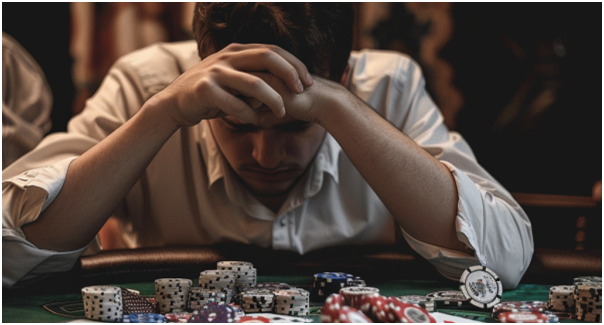- CapperTek
- Sports and Betting Blogs
- Why Does Gambling Addiction Happen and How to Fight It?
Why Does Gambling Addiction Happen and How to Fight It?
Thu, Mar 28, 2024
by
CapperTek

Responsible Gaming: Balancing Gambler's Experience and Well-Being
Gambling has existed since the dawn of
time, as long as there were humans. From throwing bones to wooden dice to card
games and raffles, and with online casinos today, the players have not changed.
Because of that, we can say with certainty that both the entertainment and the
addiction, the good and the bad, and primarily biological.
There are some cases where people are
biochemically predisposed to having a gambling addiction. In those cases, there
is little more we can do than identify them and not allow them to play, at
least not for money.
But, some are affected by the wider
societal appeal of easy money. In benign cases, they will just look up roulette cheat and card game tactics to improve their
odds. If it spirals out of control, this can lead to gambling addiction as well
as severe depression because things are “not going as they are supposed to”.
What Makes Gambling Fun and Addictive?
Jumping over philosophical discussions,
people are very much bound by their brain chemistry. For gambling, it is all
about dopamine, cortisol, and adrenaline. By quickly spiking each of the three,
gambling can make us think that the game we are playing is much more important
than it is and much more useful to do than anything else.
The prefrontal cortex forces us to have
an illusion of control. When we are winning, it’s because we are superior
thinkers. But, when we are losing, we are simply being scammed or punished by
higher forces and we will win again soon.
For most people, gambling is much closer
to a rollercoster ride, where we know the activity is inconsequential, but we
do it because it's fun. But, some people who get hooked on this switch of
adrenaline, which forces hyperactivity, and cortisol which induces stress, to
dopamine which forces happiness get addicted to gambling.
How Casinos Exploit Human Biology
Primarily, casinos are bright, colorful,
and opulent. People like being somewhere where they can feel as if they are of
a higher social standing and have their luck in their hands. Both the casino
exterior, or user interface if you are playing online, and the games themselves
force these things.
Second exploit the “near miss”
hypothesis. We are forced to think that a close number means we are almost there.
We know both mathematically, logically, and practically that this is not the
case, but our subconscious mind will still think this.
A good example is roulette. People who
play the Zero in European roulette will say that they got “close to winning” if
the ball drops to 1,2, 26, or 32. This is because 1 and 2 are near Zero on the
board and 26 and 32 are near on the wheel. But, all of the numbers are
mathematically identical to come up.
Fighting Gambling Addition
As is the case with any psychological addiction, treating both compulsive gambling and other
types is a lifelong process that will usually require both some medication like
opioid receptor antagonists (ORA) as well as cognitive, behavioral, and group
therapy.
Although the causes are biological and
thus incurable, the symptoms can be pushed to the point where the patient would
never again suffer from the adverse effects of gambling.
Thankfully, most casinos have introduced
policies to identify those who might have a disorder and prevent them from
playing as well as offer some assistance. But, that is just the first step.
Improving Legislation
Although casinos will take steps against
gambling addiction purely on the rational stance that it’s not good for
business, that may not be enough. Recognizing that those suffering from
addiction need help and finding ways to provide it through legislation may be
necessary.
Changing the Narrative
The best way to prevent an increasing number
of people suffering from gambling addiction is changing the narrative. Gambling
and betting shouldn't be seen as somewhere where high-rollers come to win large
amounts of money, but rather as cheap and accessible entertainment, which it
is.
A
person who spent $20 to play slots for two hours is the same as a person who
bought a movie ticket to get entertained for two hours. This will exclude the
social aspect of addiction and leave us to focus only on those who have an
actual, biochemical, issue.